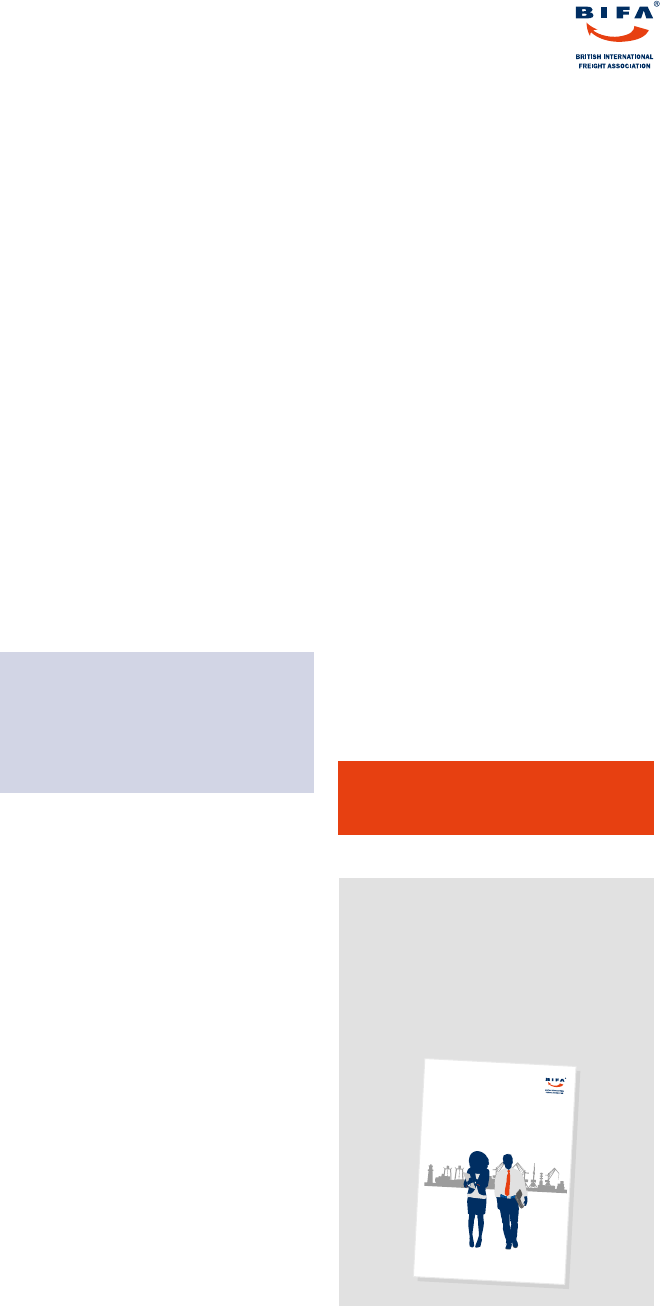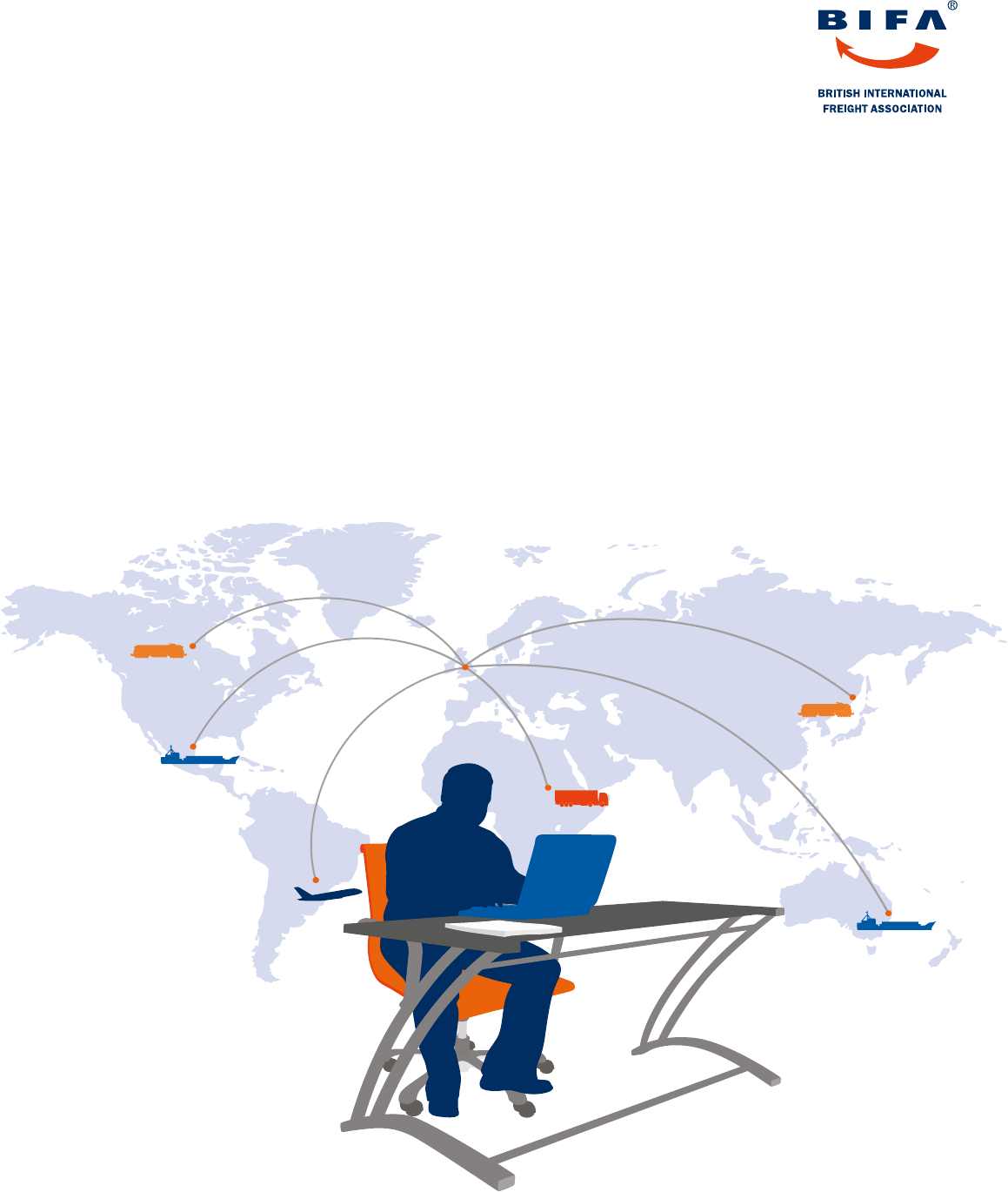
A freight forwarder provides a service to people and companies
wishing to send goods from one country to another. The goods that
are shipped can vary from a small parcel up to huge items. The mode
of transport can be road, rail, sea or air.
Forwarders arrange the transport
details so that the freight arrives at its
destination in good condition and at
the right time. They research shipping
prices, provide information on routes,
book cargo space, prepare and
check documentation, handle various
regulatory requirements and can arrange
many value-added services.
The industry is global and international
logistics rms vary from multinationals
to SME (small and medium enterprises).
This document looks at setting up
a freight forwarding business and
examines some of the issues involved.
Knowledge of the Industry
A freight forwarder has a broad range
of skills and abilities which may be
summed up as knowledge of the
industry. You will be entering a complex
market lled with a multitude of differing
practices and regulations, so some
of your knowledge will be theoretical,
gained from studies, and could involve
international trade law, economics,
nance or trade. It will also consist
of practical experience in the freight
forwarding trade or in something similar.
The more awareness you have of
overseas markets, shipping methods,
insurance, paperwork, specic products
and their Customs procedures, the
better. Compliance with regulations
is essential and knowledge of the
transport of dangerous goods or the
UK Department for Transport Aviation
Security regime may be needed.
Training and Qualications
To be a freight forwarder, no formal
training or qualications are ofcially
required but industry tuition is highly
recommended. If your business is
more complex, for example, involving
the carriage of hazardous materials,
forwarding freight overseas, or the
provision of insurance, you may well
be required under IATA regulations or
UK law to hold qualications yourself
or ensure one or more of your
employees do.
There is a wide choice of training
available in all aspects of the freight
industry, and BIFA runs courses on a
regular basis. More information can
be found at www.bifa.org/training
Rules and Protocols
Numerous sets of rules and protocols
govern international trade. Trading
conditions may be used in contracts for
the carriage of goods, and you should
be aware of how they are interpreted
and implemented, as well as being
familiar with different types of contract.
You need to be very clear as to your
responsibilities and liability under any
new contract you strike. You should also
be familiar with agency agreements and
the Law applicable to Agency, letters
of credit and bills of lading. You may
well be the principal or contractor for
forwarders across the world.
Insurance
You will need insurance to protect your
exposure to liability under Common Law
or any of the Conventions or Trading
Conditions which you operate against.
You should also have employer’s and
public liability cover. Liability insurers
and brokers will often require a freight
forwarder to be a member of BIFA before
providing cover.
BIFA Membership
Most UK freight forwarders are members
of BIFA and use the BIFA Standard
Trading Conditions which are regularly
reviewed against consumer legislation
and the Unfair Contracts Terms Act.
Information on how to join BIFA
can be found at www.bifa.org
BIFA Good Practice Guides
bifa.org
Preparing to Become
a Customs Agent
If you plan to offer Customs
clearance services, you should
refer to the separate BIFA
guides on preparing to become
a Customs Agent and the role
and responsibilities involved.
Redfern House, Browells Lane, Feltham, Middlesex TW13 7EP T: +44 (0)20 8844 2266 E: bifa@bifa.org W: www.bifa.org
July 2021
This Guide has been produced by the Association with a view to providing general industry guidance to members. However, it is not legal advice nor is it a substitute for legal advice. The Association is
only in a position to provide general non-legal guidance as each member’s situation may be different and this may affect particular legal advice that may be given by suitably qualied lawyers to each
member. The Association is not able to provide legal advice and if you wish to ensure that any specic action you intend to take while relying on this general guide is legally appropriate you are advised to
consult a qualied lawyer experienced in the relevant legal eld which may include forwarding, transport, logistics, international trade and commerce in advance of taking such action.
Page 1 of 1

